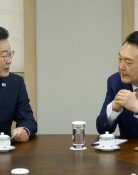Taiwanese presidential election`s effect on Northeast Asia
Taiwanese presidential election`s effect on Northeast Asia
Posted November. 09, 2015 09:55,
Chinese President Xi Jinping and Taiwan`s President Ma Ying-jeou had a first summit meeting on Friday in Singapore, discussing matters over the cross-strait relations. The summit meeting carries historical meaning in that it was the first one since they separated in 1949. Chinese President Xi said, We are brothers connected by flesh even if our bones are broken. We are a family whose blood is thicker than water, stressing One China. Taiwanese President Ma responded by saying, The people in the cross-strait relations are Zhonghua minzu (Chinese ethnic group).
To display the relations on an equal footing, they chose a neutral term to address each other with mister, not president. Prior to the meeting, it was agreed not to release any agreement, which was arranged for the smooth meeting that was described as a dangerous political provocation by Western media.
"The separatist forces of the `Taiwan independence` and their activities are the biggest hindrance for the peaceful development of the cross-Strait ties, biggest threat of the cross-Strait stability and therefore should be resolutely opposed, Xi said, sending a warning signal to Taiwans independence notion by the Democratic Progressive Partys Tsai Ing-wen who is expected to win at the next presidential election on January next year. It was an open support of Xi for Taiwan`s ruling Nationalist Party. The meeting proved the different power status of nations and leaders between the two. While Ma had a press conference in person after the meeting, China had the minister of Chinas Taiwan Affairs Office give a speech. Although the summit was held based on 1992 Consensus (the principle that both sides recognize there is only one "China but agree to interpret the meaning of that one China according to their own individual definition),it ended up confirming Chinas notion of not recognizing Taiwans independence.
With only six months left before the end of presidential term, the Taiwanese president attended the summit meeting to change the development of the campaign that is not favorable for him at the moment. An enemy who waged a war 70 years ago has become a friendly force standing against Taiwans Democratic Progressive Party. Since 2008, the human exchange between China and Taiwan has increased to more than 8 million annually and trading volume to 170 billion U.S. dollars. However, the portion of population in favor of Taiwans independence increased to 80 percent from the previous 60 percent due to the concern that Taiwan could be incorporated into Socialist China. Taiwans presidential candidate Tsai Ing-wen of the Democratic Progressive Party criticized Ma saying that he attended the summit with the suspicion of closed-door meeting only to return with a bigger trouble. The summit is expected to have little effect on the election as the public opinion over the meeting is divided upon political factions.
Holding China in check, the U.S. and Japan must have high interest in Taiwans upcoming presidential election even though the two have kept silence on it. When and if Xis support and political consideration would not work out in the election, there would be subtle changes in political circumstances in Northeast Asia.







